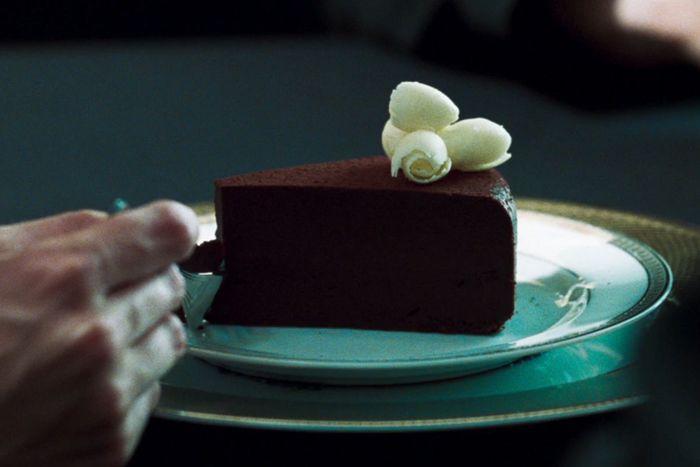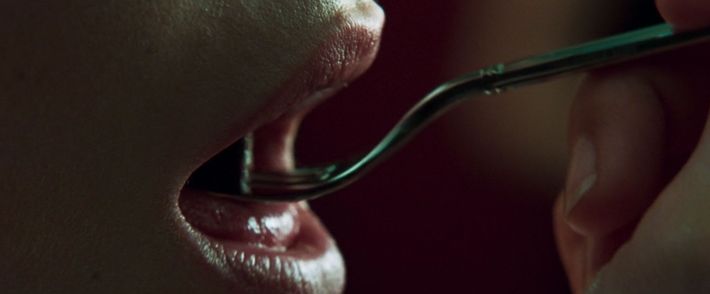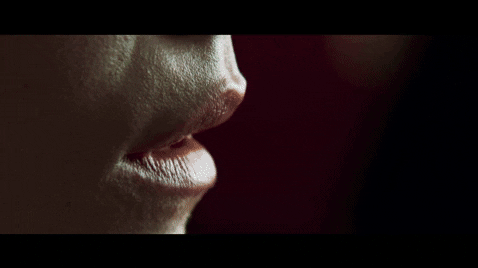
It’s May 2003, and expectations for The Matrix Reloaded are high. Pretty much the entire original cast is back: Keanu Reeves as Neo, Carrie-Anne Moss as Trinity, Laurence Fishburne as Morpheus, Hugo Weaving as Agent Smith. (The Wachowskis’ trilogy finale, The Matrix Revolutions, is already slated for November.) When Reloaded finally lands in theaters, however, reactions are mixed. The actions scenes get some praise, but the script doesn’t fare as well (“deep-dish speechifying,” Peter Travers puts it in Rolling Stone). In a New York Times piece titled “A Memo to the Wachowskis From a Disappointed Fan,” Philip Graham eviscerates the story with one notable caveat: “I have to admit that the Merovingian’s programmed food is a good one.” “One of the few effective new ideas in Reloaded,” he adds.
He’s talking about the cake scene, an oft forgotten aspect of the Matrix legacy. The Wachowskis gave us meticulous fight choreography, dense philosophy, tiny sunglasses and latex, but lest you forget, they gave us an orgasm cake, too. In the scene, the old program known as the Merovingian (Lambert Wilson) demonstrates to Neo, Trinity, and Morpheus his ability to play with causality in the Matrix by sending a restaurant patron (Tory Mussett) a slice of cake. That piece of cake is really a piece of code that sends her into a very public climax, illustrated on screen with the franchise’s signature stream of neon-green binary exploding between her legs. It’s a shamelessly horny moment that reflects so many of the Wachowskis’ bolder filmmaking impulses. The takeaway is clear now: Behind all their musings about faith and destiny and self-actualization, the Matrix is as much about the bone-shaking, consumptive carnality of life.
Back in 2003, there wasn’t much more consideration of the orgasm cake or what it was meant to signify in the Wachowskis’ world-building. Much like the rave scene in Zion, which Travers labeled as “a tacky bust, generating embarrassment, not heat,” it was received as something to be gawked at and giggled about. But to dismiss the orgasm cake — or that sticky-sweaty dance party, or the kiss that Persephone (Monica Bellucci) cajoles from Neo — is to ignore how important lust and love are to the Matrix stories. Throughout its 138-minute run time, The Matrix Reloaded emphasizes the admirable humanity of its central characters — willing to fight the Machines, the Sentinels, and their agents — by tying their optimism to romantic love, sensuality, and attraction.
Recall what Agent Smith said in the first Matrix: Humanity is a “virus,” one that spreads itself without limits or bounds. The Matrix Reloaded takes that statement and pokes at it, exploring how the sprawl Agent Smith so despised is built on connections between people. And so everyone in Zion is very much DTF. All that slow-mo grinding in sheer knitwear during the dance party amid pools of steamy lava. The flirtatious vibe that Captain Niobe (Jada Pinkett Smith) extends to onetime lover Morpheus, his barrel chest all exposed in his sleeveless vest. The passionate-yet-tender sex scene between Trinity and Neo, their nude bodies marked by headjacks and plugs. Fluke’s “Zion” twirls faster and faster, the score choice adding a grungy, grimy backbeat to so much getting down.
The jagged rocks, squelching mud, and fiery core of Zion contrast severely with the setting of the orgasm cake scene. When Neo, Trinity, and Morpheus walk into Le Vrai, the restaurant where an ancient program called the Merovingian is holding court, they’re greeted by marble and glass. The Merovingian’s wearing a crisply tailored suit and his wife, Persephone, is in latex (polished with personal lubricant, as explained by costume cutter Roger Tait), far removed from the earth tones worn by humans. These are programs pretending to be people, straddling the line between perfection and artificiality.
What kind of cake does the Merovingian send? It’s obviously chocolate, with a density that makes me think flourless, maybe fudge? It doesn’t put up a lot of resistance when the blonde woman on the receiving end of the baked good runs her fork through it. As the Merovingian continues to lecture — “Choice is an illusion created between those with power and those without,” he says, Frenchly and pompously — the screen switches to that green code. Just one bite of the “very special dessert” and she’s full Sally at Katz’s Delicatessen. Her mouth opens, her pupils dilate, her breathing quickens, and the Wachowskis commit to the bit by zooming in between the woman’s legs and letting her orgasm play out like a cascade of fireworks.
“Just like poetry,” the Merovingian sneers, and we are all Persephone, rolling her eyes at her husband for once again brainwashing a woman into a sexual act. That is, in part, what the orgasm cake scene signifies. The Merovingian has amassed so much power in the Matrix that his amusement comes not from feeling anything himself, but from forcing others to feel — maneuvering them like pieces of cake.
“Soon the why and the reason are gone, and all that matters is the feeling itself,” the Merovingian notes (before following the blonde into the bathroom, of course). Persephone remembers when her “pompous prick” of a husband used to love her, and seeing how deeply Neo and Trinity care for each other, this exchange hurts all the deeper. When later Persephone decides to deceive her husband and help Neo, she requires payment in the form of a kiss. “Just a sample,” she says, before adding an important qualifier. “You have to make me believe I am her.”
The difference between Persephone’s bargain and her husband’s little death by chocolate is what each of them wants: Persephone wants to feel alive again by being touched by someone who is himself alive. The Wachowskis present Persephone and Neo’s kiss as a moment so transformational for the former that she loses herself in it, giving herself over to emotions that are, fundamentally, human. “I envy you, but such a thing is not meant to last,” she tells Trinity.
What has lasted, though, is the goofiness and gonzo-ness of the orgasm cake. The Wachowskis have given us many silly things throughout their filmography: Tom Hanks’s goatee in Cloud Atlas, Channing Tatum’s ears in Jupiter Ascending, the bisexual lighting of Speed Racer. It would be easy, and a mistake, to diminish these aesthetic choices as style over substance. Even in an NSFW dessert, the sisters’ through-line of emotional truth is easy to find.







